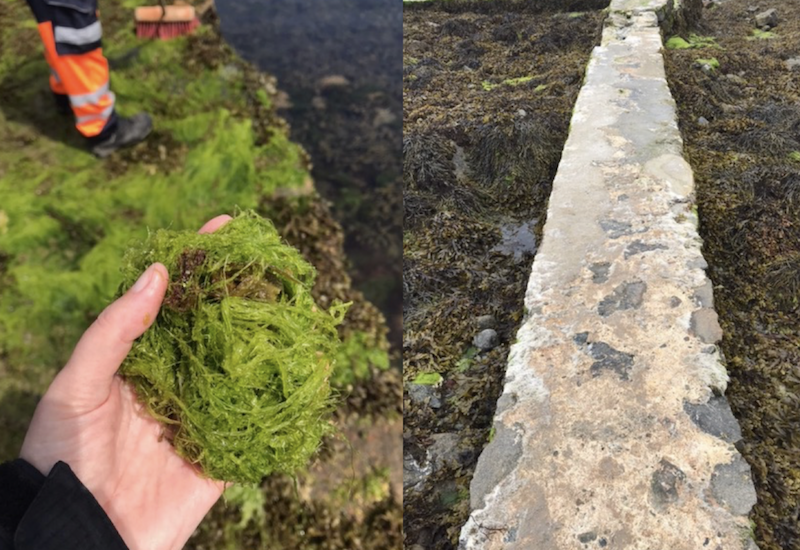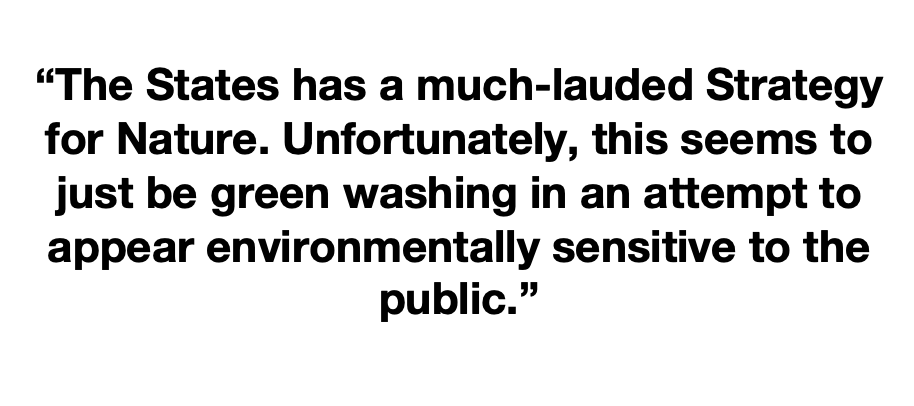


A conservation group member has urged the States to stop using bleach to tackle algal growths around the island’s coast.
The Department of Agriculture, Countryside and Land Management has been using sodium hypochlorite, more commonly known as bleach, to treat piers and slipways. It’s diluted and used to kill off algal growth, with the intention of stopping people slipping and tripping.
A member of the Sea Shepherds conservation group has published an open letter to ACLMs, urging the government body to stop as soon as possible, after raising concerns of its devastating impact on the natural environment.
“It’s completely toxic for all wildlife. It burns any living tissue (dog pads, children’s skin) and scorches to death all the organisms that live in the intertidal zone where it is applied; snails, crabs, mussels, worms and a multitude of marine plants,” said Jenny Bennett.
“Published research shows that fish suffer incredibly painful deaths when exposed to sodium hypochlorite, where they experience reduced oxygen uptake due to gill damage, the destruction of fin membrane of the dorsal fin where the bleach ‘melts’ the tissue, and severe congestion of blood vessels and capillaries; all of which of course leads to mortality.”

Working alongside ACLMS, Ms Bennett has in the past helped trial a product called Marine Algae Cleaner. It can be applied without a permit and has passed the requirements of the Environment Agency in the UK.
“The States Works workmen were completely on board. They expressed happiness at not having to be worried about inhaling a toxic biocide, and were very happy that they did not have to wear any PPE,” said Ms Bennett.
“Usually they have to wear a full suit when they use the sodium hypochlorite, and it’s uncomfortable and they get very hot. They are also worried about inhaling the sodium hypochlorite, knowing that it damages their lungs, and are saddened when they see it killing all the intertidal life as they apply it.”
Despite this, ACLMS continues to use a 50/50 mix of bleach because it said MAC doesn’t kill off the longer lengths of algal growth.

Pictured: When asked for comment by Ms Bennett, Deputy Gavin St Pier said: “I was surprised to read about this situation as I had no previous knowledge, so I’m really grateful to Jen for raising awareness around this. I would hope that the alternative treatment can be rapidly adopted.”
“ACLMS understands the risk associated with sodium hypochlorite which is why it is carefully administered only on the walking surfaces of piers and slipways by trained professionals using a 50/50 diluted solution, rather than neat,” said a spokesperson for ACLMS.
“ACLMS has responsibility for both ensuring public safety on the land we managed and to fulfil our obligations under the Strategy for Nature to preserve and protect our natural environment. We also need to make sure we make the best use of our resources and spend public money wisely. Unfortunately, in some circumstances these responsibilities conflict with one another and we have the difficult job of finding the right balance.”
The States’ body said it continues to investigate the potential use of MAC, with the manufacturer coming over to the island in October to advise on treating longer weed growth.
Jersey, Herm, and Sark have all adopted the use of MAC instead of bleach, and Ms Bennett has urged the States of Guernsey to do the same.
Pictured top: Before and after the application of MAC during a trial at Portelet.
Comments
Comments on this story express the views of the commentator only, not Bailiwick Publishing. We are unable to guarantee the accuracy of any of those comments.